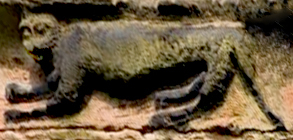Cheshire Cat
Cheshire Cat is a fictional character from the book Alice's Adventures in Wonderland by Lewis Carroll. Known for its distinctive mischievous grin, the Cheshire Cat has become one of the most iconic characters in English literature, symbolizing the whimsical and topsy-turvy nature of Wonderland.
Characteristics[edit | edit source]
The Cheshire Cat is characterized by its broad grin and its ability to disappear and reappear at will, often leaving nothing but its smile visible. It is capable of speech and engages Alice in perplexing conversations that challenge her perceptions of reality. The character is often interpreted as a philosophical figure, posing questions about existence, identity, and the nature of reality that reflect the book's overarching themes.
In Alice's Adventures in Wonderland[edit | edit source]
In Alice's Adventures in Wonderland, the Cheshire Cat first appears in a tree, guiding Alice with cryptic advice. It is one of the few creatures in Wonderland that does not outright frustrate or antagonize Alice. Its ability to vanish gradually until nothing is left but its grin is one of the most memorable aspects of the character and the story.
Cultural Impact[edit | edit source]
The Cheshire Cat has had a significant impact on popular culture, appearing in various forms of media, including films, television shows, and merchandise. Its enigmatic smile and philosophical dialogue have made it a symbol of the absurd and surreal aspects of human experience. The phrase "grinning like a Cheshire Cat" has entered the English lexicon as a way of describing a wide, unfaltering smile.
Adaptations[edit | edit source]
The character has been adapted into various media, including the 1951 Disney animated film, where it is portrayed as a mischievous yet benign figure that helps Alice navigate the confusing world of Wonderland. In other adaptations, such as video games and live-action films, the Cheshire Cat's role and personality vary, reflecting different interpretations of the character's significance and symbolism.
See Also[edit | edit source]
This article is a literature-related stub. You can help WikiMD by expanding it!
Search WikiMD
Ad.Tired of being Overweight? Try W8MD's physician weight loss program.
Semaglutide (Ozempic / Wegovy and Tirzepatide (Mounjaro / Zepbound) available.
Advertise on WikiMD
|
WikiMD's Wellness Encyclopedia |
| Let Food Be Thy Medicine Medicine Thy Food - Hippocrates |
Translate this page: - East Asian
中文,
日本,
한국어,
South Asian
हिन्दी,
தமிழ்,
తెలుగు,
Urdu,
ಕನ್ನಡ,
Southeast Asian
Indonesian,
Vietnamese,
Thai,
မြန်မာဘာသာ,
বাংলা
European
español,
Deutsch,
français,
Greek,
português do Brasil,
polski,
română,
русский,
Nederlands,
norsk,
svenska,
suomi,
Italian
Middle Eastern & African
عربى,
Turkish,
Persian,
Hebrew,
Afrikaans,
isiZulu,
Kiswahili,
Other
Bulgarian,
Hungarian,
Czech,
Swedish,
മലയാളം,
मराठी,
ਪੰਜਾਬੀ,
ગુજરાતી,
Portuguese,
Ukrainian
Medical Disclaimer: WikiMD is not a substitute for professional medical advice. The information on WikiMD is provided as an information resource only, may be incorrect, outdated or misleading, and is not to be used or relied on for any diagnostic or treatment purposes. Please consult your health care provider before making any healthcare decisions or for guidance about a specific medical condition. WikiMD expressly disclaims responsibility, and shall have no liability, for any damages, loss, injury, or liability whatsoever suffered as a result of your reliance on the information contained in this site. By visiting this site you agree to the foregoing terms and conditions, which may from time to time be changed or supplemented by WikiMD. If you do not agree to the foregoing terms and conditions, you should not enter or use this site. See full disclaimer.
Credits:Most images are courtesy of Wikimedia commons, and templates, categories Wikipedia, licensed under CC BY SA or similar.
Contributors: Prab R. Tumpati, MD





